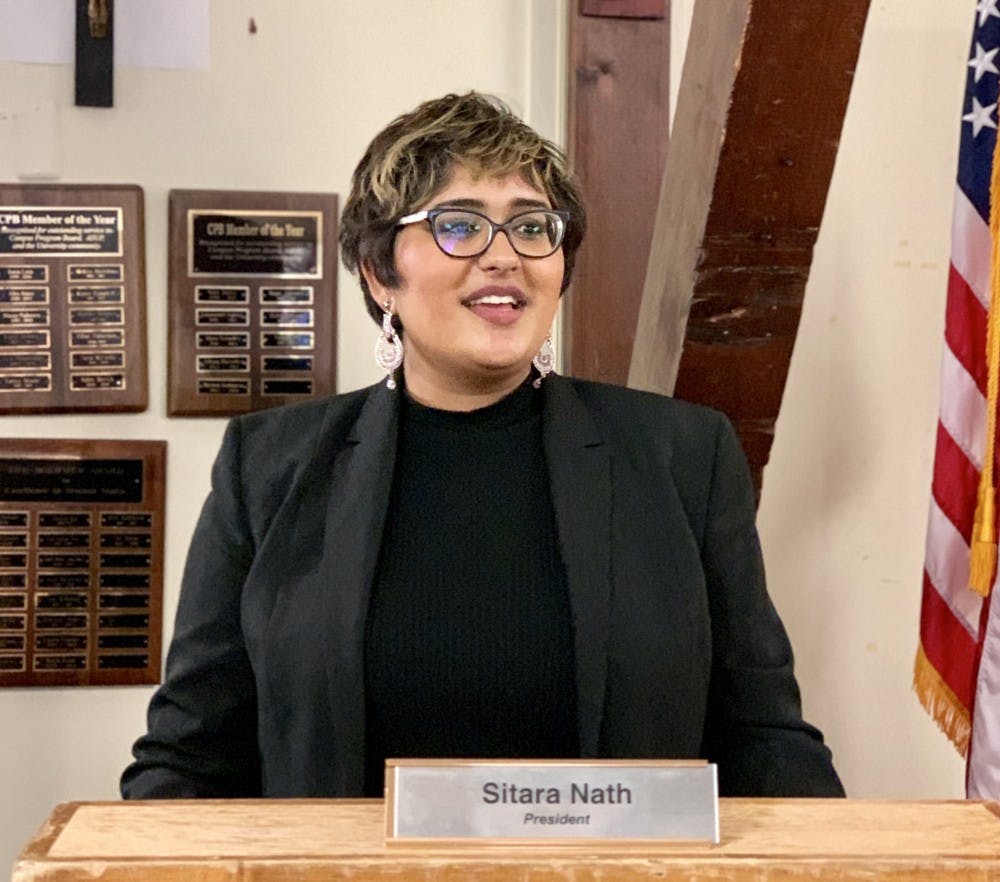Every semester the ASUP President presents a State of the Campus Address to inform the UP community of the projects ASUP is working on, highlights from student leaders, clubs, & organizations, as well as ongoing campus initiatives.
The following address was given by ASUP President, Sitara Nath, on Monday, April 15th at 4:30 pm in St. Mary’s:
"For my concluding State of the Campus address, it seems appropriate to me to think back to the plans, promises, and hopes Michael and I shared with the student body during Speech Night last year. We stood before over 100 members of our community and I ended our candidacy speech by asking students to reflect on a single guiding question as they voted: What kind of legacy do we want our leaders to leave behind?
I recall that I asked this question because I didn’t yet have the answer. But I’ve always been compelled to focus on student legacies because our time here on the Bluff is so temporary. In many ways, what we do here can be reversible, short-lived, forgotten as years pass only to be dusted off and reclaimed as a fresh innovative idea by a new student leader. But if we reflect on the lasting impression we have left during our short 4-year tenure at UP, perhaps what we do here isn’t so temporary after all.
Looking back on this year, I see that many of the efforts led by students, faculty, and staff advocates have all reflected a common theme – one of building relationships that have never been explored before, of showing up for each other in a way that I have never seen on this campus. Everything about our legacy and our year comes down to this idea of opening doors for connection, community, and conversation.
As I was preparing for today, one of my friends poignantly reminded me that this is not a State of ASUP Address – it’s a State of the Campus. It seems fitting then, to start by looking out into what has been happening on our campus first and to recognize initiatives that have not had their rightful time in the spotlight, initiatives that have opened doors for students at UP.
One of those very initiatives that immediately comes to mind is that of the First-Generation Mentorship program through the Shephard Academic Resource Center. This program began in spring of 2017 and with the support of incredible leaders, advocates, and even ASUP, it has since become one of the strongest mentorship programs UP has to offer. Mentors discuss Life on the Bluff, financial aid, self-care, and so many other dimensions of student life that first generation students have a unique experience with. The First-Generation program is one that ought to remind us that the conversation of diversity goes down to the deepest parts of our identities – that it is not just about surface level differences, but also experiential commonalities that bring us together at UP.
Our year has also been shaped by some of UP’s most successful and most celebratory cultural events this semester. Guam Night, PCN, International Night, and Holi are just some of the outstanding examples of this – opportunities for students to honor their identities and origins and spaces for the larger community to broaden our minds and our hearts.
Hawaii Club’s Luau theme this year was “Coming Together for the Betterment of Our World” and I believe there simply is no better way than this to capture how UP’s cultural dialogue is also shaping our legacy.
Another group of leaders which has opened many doors for collaboration and inclusive dialogue has been the Diversity Collaborators and Yuri Hernandez Osorio. I want to honor these students by name: Hazel Stange, Karl Kahambwe, Stephen Laphen, Marisa Johnson, and Sabrina Legaspi. These students are often in the backdrop of the most intersectional and thought-provoking conversations that happen on our campus. This year’s Diversity Dialogues event series captures this beautifully – events on white feminism, a Holocaust Remembrance Shabbat, Defining Latinx, and Accessibility awareness all serve as reminders of the honorable work these students and Yuri have done to spark our campus’ conversations on truly inclusive practices. What they have created this year demonstrates the real value of our liberal arts education – one that seeks to uproot our preconceived notions of the world while offering us a deeply enriched and broadened worldview instead.
ASUP’s successes this year have also been groundbreaking and from where I stand, all of you have played an equally critical role in opening doors for the student body to connect and to collaborate. Senator Janiece Moore is someone whose work I want to highlight here – Senator Moore’s commitments to sustainability is evident in her community partnership with Ruby Beauchamp, another phenomenal leader who heads a variety of clubs and initiated the Sustainability Action Fund through ASUP. These two individuals have driven all of us to live with a level of consciousness and care that we will take with us wherever we go.
With the support of Senator Sage Taylor, ASUP also created a search committee which helped with the hiring of a new theology professor whose identity and specialty in queer theology reminds us why it is so crucial to have faculty members who reflect our student population. That search committee is an enormous point of pride for me this year – because it brought together voices who have not always been heard at UP and gave them a seat at the table. This success especially stands out to me as one which reminds us that diversity is not a platform but a way of being, a way of thinking, and a way of existing as a community.
ASUP’s contributions to our broader legacy also came through the numerous equitable, thoughtful, and deliberative decisions made this year by our Director of Finance, Brandon Wester – under Brandon’s leadership, the Students Against Sexual Assault received funding for their Spring Week of Action. Black Student Union was funded for their For the Love of Chocolate poetry slam event. The leaders of the Period Movement received funding to address the issue of inaccessible and unaffordable feminine hygiene products. All of these demonstrate Brandon’s commitment to true equity and inclusivity even in the midst of limited resources.
Under our Vice President, Michael Gallagher, ASUP Services have flourished and their collaborative spirit has as well. ASUP Films partnered this year with the Native American Association, Active Minds, the Gender and Sexuality Partnership, Black Student Union, the College Ecology Club and so many more. Also under Michael’s leadership, an initiative to provide free STI testing to the student body came to fruition which is now one of the lasting changes that he will be leaving behind. Michael, our partnership has made us a dynamic force to be reckoned with. Thank you for pushing all of us and for pushing me to remain rooted in our convictions.
Our organizational commitment to our values also cannot be fully appreciated without the recognition of our Director of Communications Kathleen Burks. This year, Kathleen’s role in expanding ASUP’s outreach to the student body has been the cornerstone of our success – her commitment to engaging the student body’s needs with our newsletter, social media, and Speech Night is the primary reason that ASUP is finally moving away from its reputation as an insular, inward looking organization – towards one that looks outward because Kathleen truly sees the potential in every relationship ASUP can build with students.
Aside from pushing ASUP to focus on our outward presence, it is equally important to acknowledge how our Speaker of the Senate, Brady Boos, has found ways to invite community members into our space. ASUP still has so much work to do to become an inviting organization but Brady’s efforts have actively welcomed community leaders from the Career Center, from the Presidential Advisory Committee on Inclusion, from student Athletic Committees, from Early Alert Coordinators, and so many more. That ASUP is functioning so well relies heavily on diligence, dedication, and professionalism Brady brings to the table every day.
The topic of student legacies also instinctively makes me think of the Campus Program Board leadership team and Director Kaity Sullivan. Her sharp wit, quietly powerful leadership, and unique creativity infuses everything she and her team have done this year. This year’s Rock the Bluff had an attendance of 2400 students but to me, it seems insufficient to measure the success of anything CPB does with just numbers. The word that keeps coming up from students is unforgettable – by far, one of the most impactful and lasting impressions that we have left on the student body has been every unforgettable experience that CPB has given us.
While the State of the Campus is one of the most important opportunities ASUP has to highlight successes and accomplishments on our campus, I believe it also must be used to address the work that has yet to be done. Being a student and stakeholder at the University of Portland necessarily gives us the right to criticize it objectively and to ask for more. In doing so, we remind this wonderful institution that we still believe in its potential to do more and to do better.
We know, for example, from the 1 year that it has been open that the Diversity Space established on campus is merely a refurnished conference room and that it is nowhere near sufficient in size and resources to address the needs of an increasingly diverse student population.
We witnessed from the Take Back the Night event coordinated by the Students Against Sexual Assault and It’s on Us team, that survivors of interpersonal and sexual violence silently exist on our campus, drawing resilience from the few spaces they have to safely share their stories. We know we still have countless steps to take before we have achieved a truly survivor-oriented support system and culture at the University of Portland.
We know that the hiring of a Director of Equity and Inclusion in February of last year was promised to us and that that hiring process, after failing once, has not been re-initiated.
We witnessed the heartbreak of students of color this year when classes, once again, were still scheduled during Martin Luther King Day – and while we know that UP will be recognizing this powerful day next year, we must problematize the extensive and unacceptable amount of time that it took UP to make this decision.
As we transition into yet another year of new leadership, I ask that all of us, especially those who will remain at UP, embrace our roles as stakeholders with these issues more than ever before.
It has been the biggest privilege of my life to serve with and for all of you this year. Thank you for your outstanding contributions to ASUP and to the student body. My biggest wish for all of you is that you continue our legacy of opening doors so that others can walk through them. It is truly a legacy worth fighting for."
ASUP Director of Communications Kathleen Burks can be reached at burks19@up.edu.








